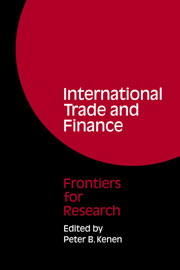Book contents
- Frontmatter
- Contents
- List of Contributors
- Preface
- PART I TRADE, PROTECTION, AND DOMESTIC PRODUCTION
- Testing Trade Theories
- The Costs and Consequences of Protection: A Survey of Empirical Work
- Trade Policies and Economic Development
- Discussion
- PART II ECONOMETRIC MODELS OF TRADE AND PAYMENTS
- Part III PAYMENTS ADJUSTMENT AND THE MONETARY SYSTEM
- PART IV AN OVERVIEW AND AGENDA
- Glossary of Frequently Used Acronyms
- Author Index
The Costs and Consequences of Protection: A Survey of Empirical Work
Published online by Cambridge University Press: 05 November 2011
- Frontmatter
- Contents
- List of Contributors
- Preface
- PART I TRADE, PROTECTION, AND DOMESTIC PRODUCTION
- Testing Trade Theories
- The Costs and Consequences of Protection: A Survey of Empirical Work
- Trade Policies and Economic Development
- Discussion
- PART II ECONOMETRIC MODELS OF TRADE AND PAYMENTS
- Part III PAYMENTS ADJUSTMENT AND THE MONETARY SYSTEM
- PART IV AN OVERVIEW AND AGENDA
- Glossary of Frequently Used Acronyms
- Author Index
Summary
This paper surveys empirical research concerned with protection, including the consequences of regional and nondiscriminatory trade liberalization. The relationship between theory and empirical work is discussed, but no attempt is made to provide a comprehensive survey of protection theory.
Let us start with an overview, distinguishing between research on developing and developed countries, and beginning with the former. In the postwar period, protection, especially through import quotas and exchange control, has been much more important for the economies of less developed countries than for those of developed countries. It would probably not be disputed that in India and Pakistan import quotas have really made a difference – at least in the nonagricultural sector of the economy – to an extent that cannot be found with respect to tariffs or quotas in any developed country (except possibly New Zealand). It is thus surprising that, until Bhagwati and Desai (1970), a description and analysis of the Indian import-control system was not publicly available. Indeed, until the last few years very little was available on protection in the less developed countries.
What were the reasons for this? Perhaps there is an inevitable lag before new situations – such as industrialization by import substitution as a result of the aftermath of the Korean boom – are recognized as requiring study, and before research is organized. Perhaps there was a tendency for economists working on less developed countries to be preoccupied with doubtfully relevant problems and techniques popular in the United States and the United Kingdom.
- Type
- Chapter
- Information
- International Trade and FinanceFrontiers for Research, pp. 51 - 92Publisher: Cambridge University PressPrint publication year: 1976
- 4
- Cited by

